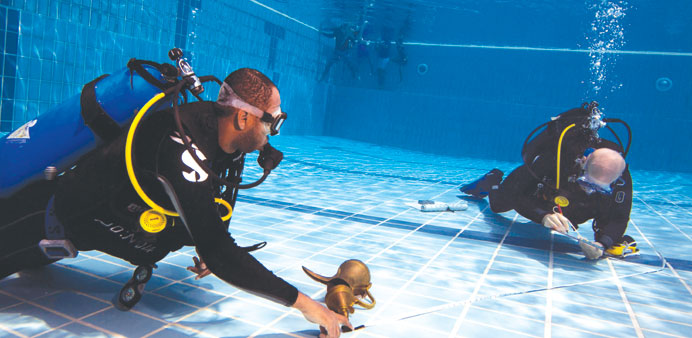|
The first ever formally accredited maritime archaeology course in the Gulf region has taken place at UCL Qatar. |
The intensive two-week course, with a particular focus on maritime archaeology in the Arabian Gulf, provided students with an overview of the principles and practices of maritime archaeology.
The pioneering programme was recently conducted under the tutorship of Dr Lucy Blue, Maritime Archaeology Stewardship Trust, University of Southampton, and Dr John Cooper, University of Exeter.
A highly specialised course, it attracted individuals from within Qatar, the wider Gulf region and internationally. In addition to students from the MA Archaeology of the Arab and Islamic World degree programme at UCL Qatar, invitations to join the course were accepted by employees from the Ministry of Heritage and Culture of Oman, together with Italian archaeologist Lorena Giorgio and members of the University of Birmingham Underwater Survey team working in Qatar, conducting surveys for Qatar Museums Authority.
The course commenced by addressing the development of underwater research and how the subject is defined. It highlighted the key theoretical perspectives and addressed the way in which archaeological sites in the coastal zone are managed and protected. Aspects of marine archaeological survey were outlined, including remote sensing and diver survey, as well as issues of site formation and excavation techniques.
In order to gain first-hand training in the documentation and drawing of maritime vessels, students spent a day and a half working on the extensive and rare collection of traditional boats belonging to the future National Museum of Qatar, with the help of staff from the National Museum.
First aid conservation of finds was introduced by UCL Qatar conservation specialist Dr Franca Cole. The archaeological potential of some of the major site types were also considered, including shipwrecks, boats, harbours, submerged settlements and maritime ethnography, and practical tuition was offered in survey, ethnography and heritage management.
Underwater survey training was carried out in a large swimming pool, with students being taught the techniques of underwater documentation in a controlled environment. Equipment and assistance was provided by the Qatar National Historic Environment Record.
The final day was spent in the field undertaking a coastal management assessment of the site of Fuwairat and visiting the World Heritage site of Zubarah.
Dr Robert Carter, degree co-ordinator for the Archaeology programme at UCL Qatar, said: “The maritime archaeology course sets the scene for future training so that the potential for maritime and underwater archaeology in Qatar and the Gulf can be realised.”
UCL continues to train the next generation of Qatari archaeologists and is now accepting online applications for admission to the MA Archaeology of the Arab and Islamic World degree programme. Applications must be submitted by May 1, with studies commencing on September 1.

